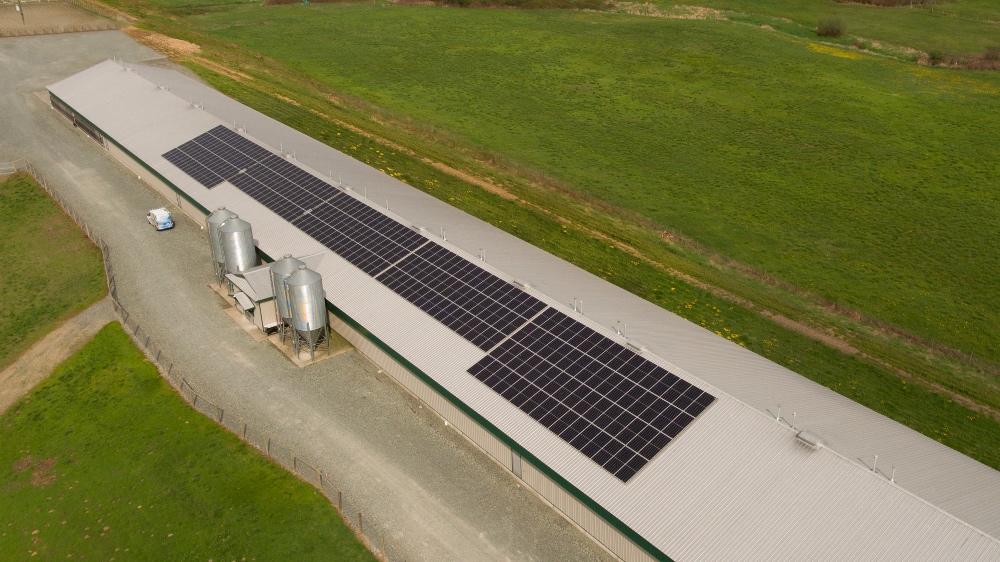
Why solar makes sense for poultry farms
By Shaun Mayhew
Features Emerging Trends Energy Week Farm BusinessFive reasons poultry barns should adopt renewable energy by going solar.
 Federal incentives can provide savings of up to 49 per cent when installing solar panels.
Federal incentives can provide savings of up to 49 per cent when installing solar panels. Agricultural businesses have been faced with some of the greatest challenges in recent years. From extreme weather events and constantly increasing costs of doing business to keeping up with changing environmental standards for air quality and even disease management.
Every part of our industry is increasing efforts to eliminate greenhouse gas emissions. Not only do solar panels help reduce greenhouse gas emissions; they can also save your business thousands of dollars. Knowing the federal incentives available for businesses is extremely important, as these incentives can cover a significant portion of solar installation costs.
Here are five key reasons for business to adopt renewable energy by going solar!
1. Receive tax incentives
Federal incentives can help offset the initial cost of installation and make solar more affordable for agricultural operations. These incentives provide savings up to 49 per cent when installing solar panels!
On March 28, 2023, the Federal government announced the Clean Technology Investment Tax Credit which provides businesses a refundable tax credit of 30 per cent and covers the capital costs of installing solar panels, as well as stationary storage systems such as battery backup power.
The Canadian government offers tax incentives allowing businesses to write down 100 per cent of the solar costs in the first year. Under Class 43.1 and 43.2 in Schedule II of the Income Tax Regulations is where you can locate the appropriate information to review with an accountant to see how this applies to your business.
Both the income tax regulation incentives and the Clean Technology ITC can be combined, allowing businesses to have up to 49 per cent of costs covered in the first year of operation.
2. Protect against rising energy costs
The cost of electricity is continuing to increase as electricity providers across the country plan to increase rates annually. Additionally, providers are moving towards ‘time of use’ billing structures which charge higher rates during peak hours of energy consumption. For businesses operating during daylight hours, specifically in the afternoon, it’s expected to result in significant cost increases.
As businesses become more electrified, solar power provides an opportunity for businesses to protect themselves against these increasing costs by producing their own energy and reducing the amount of electricity consumed from the grid.
By installing solar panels, businesses can insulate themselves against these billing structure changes and protect themselves against future energy cost increases. The more electricity a business generates, the better protected a business will be from cost increases.
3. Reduce operating costs
Solar panels can help save money on your electricity bills by generating your own renewable energy from the sun. Depending on location and the solar panels system size, businesses can offset or even eliminate electricity bills entirely.
Solar panels can help businesses save money on their electricity bills, which can be a significant expense for many agricultural operations. By generating their own electricity from the sun, businesses can reduce their dependence on the grid and lower their operating costs.
4. Energy independence
By generating electricity with solar panels, businesses can become more energy independent and less reliant on utility companies. This can be particularly advantageous during power outages or when there are disruptions to the energy grid.
Power outages and other energy disruptions can be costly and disruptive to businesses. By generating electricity with solar panels, businesses can ensure they have a reliable source of energy during outages and other emergencies.
5. Reduce greenhouse gas emissions
Solar panels are a clean and sustainable energy source that produces no greenhouse gas emissions or air pollutants. By installing solar panels, businesses can reduce their carbon footprint and contribute to a more sustainable future for our planet.
Installing solar panels can help businesses demonstrate their commitment to sustainability and environmental responsibility, which can enhance their reputation and appeal to customers and investors who prioritize ethical and environmentally conscious practices.
As farmers, we take pride in our land and creating a business that is sustainable for future generations. Taking advantage of these government incentives significantly reduces the initial investment of putting your rooftop to work when going solar. Many agricultural businesses are capitalizing on these incentives to harness the power of the sun and to help future proof their business from increasing electricity costs.
Shaun Mayhew is the President of Penfolds Roofing & Solar in B.C. The family owned and operated company has been in business for over 86 years and has installed over 15,000 solar panels during the past eight years. Penfolds has quickly grown to be one of the largest solar panel installers in the Lower Mainland and has helped numerous farmers streamline their businesses.
Print this page